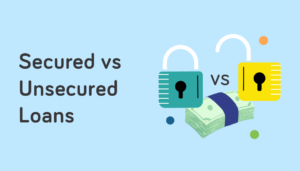When you borrow money, knowing the risks if you can’t pay it back is vital. Failing to pay back a loan can have serious effects on your financial health in the future. This article looks at what might happen if you default on a loan in the United States.
Key Takeaways:
- Defaulting on a loan can result in penalties and legal actions.
- Loan default can negatively impact credit scores and future borrowing opportunities.
- Collection efforts, such as wage garnishment and asset seizure, may be initiated by lenders.
- Legal consequences, including court judgments, can arise from loan default.
- Managing loan default situations requires informed financial decisions and exploring available options.
What Does Loan Default Mean?
Loan default is a significant financial issue. It happens when someone does not pay back their loan as agreed. This can badly affect a borrower’s money matters.
There are several ways a loan can default. It varies by loan type and agreement. Some common kinds of default include:
- Missing multiple consecutive loan payments
- Failing to make the full payment amount within the specified time frame
- Violating the terms and conditions outlined in the loan agreement
- Declaring bankruptcy, rendering the loan uncollectible
Loan defaults can happen for many reasons, like losing a job or facing a big medical bill. It’s important for people who borrow money to remember. Defaulting on a loan can cause problems that last a long time,
Defaulting brings several consequences. They include:
- Damage to Credit Score: It can hurt a borrower’s credit score a lot. This makes it hard to get new loans, credit cards, or a mortgage.
- Legal Actions: The lender can take legal actions to get back the money. This might lead to lawsuits, court decisions, or even taking part of your wages or property.
- Financial Instability: It can mess up your finances big time. It can make it hard to pay other bills and lead to more debt.
- Limited Borrowing Opportunities: It can also make it hard to get credit later. This is a problem when needing a loan for a car or house.
Defaulting on a loan is serious and has tough outcomes. It’s key for borrowers to do their best to meet their loan duties. If they’re struggling, they should seek help to dodge these long-term issues.
In the next part, we’ll look at how loan defaults affect a person’s financial health. We’ll cover the specific results of not paying back a loan.
The Impact of Loan Default
Not paying back a loan can hurt you now and later. It’s key to know what happens if you don’t pay back a loan. This way, you can make smart choices to keep your finances safe.
Affected Credit Scores
Firstly, not paying a loan can drop your credit score. This makes it tough to get more loans or good rates later. Lenders see people who don’t pay back loans as risky. So, you might get fewer options for credit and pay more when borrowing.
Reduced Future Borrowing Opportunities
Also, it becomes hard to borrow money again. Banks and lenders may not want to lend to someone who didn’t pay back a loan before. This could make it tough to get loans, credit cards, or mortgages. It might also affect renting an apartment or leasing a car because credit history matters there too.
Financial Stability
Not paying a loan can mess up your money goals. You might have to pay extra fees and legal costs. These extra costs can make your money situation worse. It can start a cycle of missing payments on other bills too.
Try to avoid not paying a loan if you can. Look into changing your loan terms or consolidating your debt. Getting advice from a money pro can help too. This can make dealing with loan troubles easier.
Knowing the risks of not paying back a loan helps you make smart choices. It helps keep your credit score up and your finances steady.
Penalties for Defaulting on a Loan
If you don’t pay back a loan, it can lead to big problems. Lenders have ways to get their money back when people can’t pay them. These penalties help make sure people think twice before not paying.
A lender might take you to court if you don’t pay back your loan. They do this to get the money you owe them. If they win, it can hurt how others see your ability to pay debts.
“When borrowers default on a loan, lenders may pursue legal actions to recover their funds, adding to the borrower’s debt and impacting their credit.”
Your wages could be taken to pay back the loan. This happens if the lender wins in court. It means you get less money from your job, which can really shake up your budget.
Lenders might also take your stuff as payment. This includes money, cars, or even your house. Losing your belongings can make it hard to get back on your feet financially.
Penalties for not repaying a loan depend on the loan type and the agreement. Always check your loan agreement. If you can’t pay, getting advice from a professional can help.
Understand the Consequences and Protect Your Financial Future
Not repaying a loan is a big deal. It eats into your financial health for a long time. Knowing the penalties and avoiding them is key to keeping your finances safe.
Effects on Credit Score
Not paying back a loan can severely hurt your credit score. This score is essential in determining if you can get future loans or other financial services. It’s a measure that shows how likely you are to repay your debts.
A loan default means your credit score will drop. With a low score, lenders see you as a higher risk. This can make it hard to borrow money later. You might face higher interest rates or strict rules when you try to borrow again.
Defaulting on a loan affects more than just your immediate credit score. Missed payments and high debt can hurt your credit report for years. Rebuilding good credit might take a long time.
“A poor credit score can limit individuals’ access to favorable financial opportunities and hinder their ability to achieve important milestones, such as buying a home or starting a business.”
A bad credit score affects more than just loans. Landlords, insurers, and even some jobs might check your credit. So, not paying back a loan could hurt your life in many ways. It impacts both your finances and your chances at certain opportunities.
It’s vital to know how loan defaulting can damage your credit. Making payments on time and getting help with financial problems is essential. This way, you can keep a good credit score and access better financial chances later.
| Consequences of Defaulting on a Loan Agreement | Loan Default Impact |
|---|---|
| Limited access to future loans and credit | Lower credit scores |
| Higher interest rates on future borrowing | Difficulty securing mortgages or other financing |
| Challenges when renting a home or apartment | Negative impact on insurance premiums |
| Prospective employers may view negatively | Obstacles in starting a business or securing investments |
Potential Collection Efforts
When borrowers don’t pay back a loan, lenders try different ways to get the loan amount back. These methods can deeply affect borrowers, impacting their money situation. Let’s look at common ways lenders try to collect.
Collection Agencies
Lenders often hire collection agencies to get money from borrowers who haven’t paid their loans. These agencies know how to collect debts using many strategies. They might call, email, or mail borrowers to talk about paying back the money or arranging a payment plan.
Dealing with these agencies can stress borrowers. They use strong methods to get the owed money. It’s key for borrowers to know their rights. They should also get advice when needed to handle this situation.
Lawsuits and Legal Actions
If things get more serious, lenders might sue borrowers who don’t pay back their loans. They aim to get a court decision against the borrower. If they win, they can take part of the borrower’s salary or take their property to cover the debt.
Legal issues can be tough. Borrowers may go through court, pay legal costs, and might lose money or property. They must understand what might happen if they don’t pay back a loan. Getting legal advice can help them defend their rights.
Impact on Financial Well-Being
Not paying back a loan can hurt borrowers’ money health a lot. It can ruin their credit scores, making it hard to get loans, mortgages, or credit cards later. A bad credit score also means paying more interest and facing harder loan conditions.
This negative mark on their credit history can make getting housing, jobs, or insurance difficult. Fixing their financial reputation can take years. This shows why it’s important to pay loans on time and know the risks of not paying.
Looking at the ways lenders try to get back loans and how it affects borrowers shows the big risks of not paying. Next, we’ll look into the legal troubles borrowers might face if they don’t pay their loans.
Legal Consequences of Loan Default
Defaulting on a loan affects more than just your wallet. It can also lead to serious legal trouble. If you’re facing this situation, knowing what might happen is key.
The Potential for Legal Action
Lenders can take legal steps to get back what you owe if you default. They might sue you to win a legal judgment. This is a common approach.
“If it goes to court, the judge could rule in the lender’s favor. This could mean having your wages taken or property seized.”
The Impact on Personal and Professional Life
A default affects more than your finances. It can hurt your personal and work life too. For instance, a court ruling can damage your credit score. This makes it hard to get loans, mortgages, or even to rent homes in the future.
It can also ruin your reputation, which may impact your job chances. Employers might see you as financially unreliable or untrustworthy because of this.
Protecting Your Rights and Seeking Legal Advice
If you’re in danger of defaulting, it’s vital to know your rights and get legal advice. Talk to a lawyer who knows about debt and credit laws. They can guide you through your legal options.
Getting advice early can help you understand how to fight the default or lessen its effects. It’s crucial to protect your rights and look for the best way to solve your issue.
| Legal Consequences of Loan Default | Implications |
|---|---|
| Potential for Legal Action | – Lawsuits – Court judgments – Wage garnishment – Asset seizure |
| Impact on Personal and Professional Life | – Negative creditworthiness – Difficulty securing future loans, mortgages, or rental agreements – Harm to reputation and professional opportunities |
| Protecting Your Rights and Seeking Legal Advice | – Understand your rights – Consult with an attorney – Explore options and potential defenses |
Options for Managing Default
Defaulting on a loan is serious and can hurt your financial future. But, there are ways to handle it and regain financial control.
Consider debt consolidation. It merges multiple debts into one loan with a lower rate. This can simplify payments and lower your monthly costs. It helps you keep up with repayments and avoid default.
Loan modification is another approach. You work with your lender to change your loan’s terms. Changes could include a longer loan term, reduced interest rate, or adjusted monthly payments. This can make your loan more affordable and less risky.
Talking to your lender early when payment troubles begin is crucial. Lenders might work with you to find a mutual solution. This might mean creating a new payment plan or getting a temporary break from payments.
Getting advice from financial experts is wise. A credit counselor or financial advisor can offer guidance tailored to your situation. They can help you pick the best way to manage your default.
To manage default, take action early and talk openly. By doing so and seeking help, you can overcome default challenges and rebuild your financial health.
| Options for Managing Default | Pros | Cons |
|---|---|---|
| Debt Consolidation | – Simplifies repayments – Potentially reduces interest rates – Lowers monthly payments | – Requires eligibility and qualification – May extend loan term |
| Loan Modification | – Adjusts loan terms to be more affordable – Can prevent default – Allows for negotiation with lender | – Requires approval from lender – May result in longer repayment period |
| Open Communication with Lender | – Allows for potential renegotiation – Establishes trust and cooperation | – Requires willingness from lender – May not always result in a favorable outcome |
| Professional Financial Advice | – Provides personalized guidance – Helps explore all available options | – May involve additional costs – Requires finding a reputable advisor |
Conclusion
Knowing the risks of loan default is key for borrowers in the U.S. Not paying a loan can hurt your credit and lead to legal issues. The impact on your finances can last a long time.
It’s important to make smart money choices to protect your future. Don’t take defaulting on a loan lightly. Explore ways to handle default like debt consolidation or changing the loan terms.
To protect your financial future, be aware of the penalties. Act early on managing your loans. This way, you can make wise decisions and avoid the tough outcomes of not paying a loan.
FAQ
What does loan default mean?
Loan default happens when someone fails to follow the loan’s agreed-upon terms. This includes not making payments on time or not meeting other loan contract obligations.
What are the consequences of loan default?
Defaulting on a loan can badly affect your finances. It can lead to legal action, harm your credit score, and may lead to losing your assets or paycheck parts. This damage makes future loans or credit harder to get.
How does loan default impact credit scores?
A loan default can really hurt your credit score. It signals to future lenders that you’re a higher risk. This can make it hard to get good rates or approvals for future borrowing needs.
What penalties can borrowers face for defaulting on a loan?
When you default, you might face various penalties. Collection agencies might come after you, or you could face legal troubles. You might also lose some of your wages or assets.
What are the potential collection efforts lenders may undertake for loan default?
Lenders may turn to collection agencies or legal actions to get back what you owe. They might even take you to court. These actions can make your financial life even tougher.
What are the legal consequences of loan default?
Defaulting on a loan can lead to harsh legal troubles. You could face court orders or even lose some of your property. It can affect both your personal and work life for a long time.
What options are available for managing loan default?
If you’ve defaulted on a loan, there’s hope. You can look into debt consolidation, loan modification, or debt settlement. You could also seek help from a credit counseling agency. Choose the best option for your situation.













